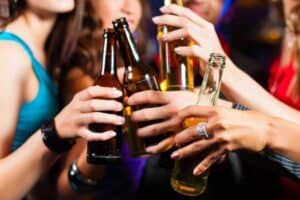- State Information
- Alabama
- Alaska
- Arizona
- Arkansas
- California
- Colorado
- Connecticut
- Florida
- Georgia
- Idaho
- Illinois
- Indiana
- Iowa
- Kansas
- Kentucky
- Louisiana
- Maine
- Maryland
- Massachusetts
- Michigan
- Minnesota
- Mississippi
- Missouri
- Montana
- Nebraska
- Nevada
- New Hampshire
- New Jersey
- New Mexico
- New York
- North Carolina
- Ohio
- Oklahoma
- Oregon
- Pennsylvania
- Rhode Island
- South Carolina
- South Dakota
- Tennessee
- Texas
- Utah
- Vermont
- Virginia
- Washington
- Washington D.C.
- West Virginia
- Wisconsin
- Wyoming
- Pricing
- Find a Location
- Device
- Why Choose LifeSafer?
- Support
Michigan: Do Later Bar Closings Lead To More Drunk Driving?

Party time might be extended in Michigan soon. The senate has passed a bill which would allow bars to serve alcoholic drinks until 4 a.m. on weekends.
Currently Michigan bars cannot serve alcohol between 2 and 7 in the morning. The new law, if passed by the House, would allow municipalities to change the 2 a.m. cutoff or keep it, as they see fit.
The reason for the vote was largely economic: with more time in which to sell drinks, the bars should do better business. In addition, the move would steal business from illegal, unregulated bars, called blind pigs, which operate in the state after closing time.
Whether or not bars should stay open late is controversial. A measure similar to Michigan’s was contemplated for Boston, as a means of attracting more foreign tourists, but the bill did not pass. The reasons given: later drinking would bring lower quality of life and more drunk driving.
Would more hours of drinking equal more DUIs? The evidence is not clear. Last October police in Cape Coral, Florida issued a report estimating that later drinking would indeed increase the number of DUIs: drunk driving arrests were rare in that city between 4 and 6 a.m., thanks to the 2 o’clock cutoff. Others argue that the number of people who drink and drive is constant, and not related to time: they will drink until two or drive, or stay till four and drive.
However, in one extreme example, it was found that restricting drinking hours in a Brazilian city led to fewer murders.
We don’t really know if the new last call time, if adopted, will have an effect on drunk driving. We do know what does, however: All-offender ignition interlock laws, combined with vigilant law enforcement, a judiciary who are on board with the goal of discouraging drunk driving, and consistent public education, will make Michigan’s roads and streets safer.
